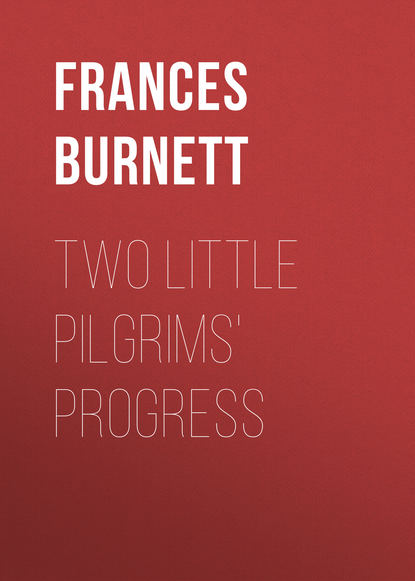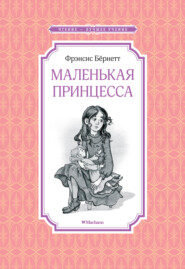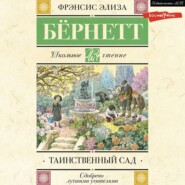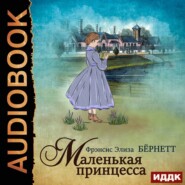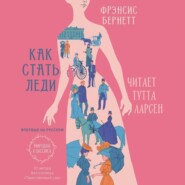По всем вопросам обращайтесь на: info@litportal.ru
(©) 2003-2024.
✖
Two Little Pilgrims' Progress
Настройки чтения
Размер шрифта
Высота строк
Поля
And he gave his forehead another rub and looked straight before him, and Meg drew a little closer to him on the straw, and the family of birds filled the silence with domestic twitters.
III
During the weeks that followed they spent more time than ever in their hiding-place. They had an absorbing topic of conversation, a new and wonderful thing, better than their old books, even better than the stories Meg made when she lay on the straw, her elbows supporting her, her cheeks on her hands, and her black-lashed gray eyes staring into space. Hers were always good stories, full of palaces and knights and robber chiefs and fairies. But this new thing had the thrill of being a fairy story which was real – so real that one could read about it in the newspapers, and everybody was talking about it, even Aunt Matilda, her neighbors, and the work-hands on the farm. To the two lonely children, in their high nest in the straw-stack, it seemed a curious thing to hear these people in the world below talk about it in their ordinary, everyday way, without excitement or awe, as if it was a new kind of big ploughing or winnowing machine. To them it was a thing so beautiful that they could scarcely find the words to express their thoughts and dreams about it, and yet they were never alone together without trying to do so.
On wet, cheerless days, in which they huddled close together in their nest to keep from being chilled, it was their comfort to try to imagine and paint pictures of the various wonders until, in their interest, they forgot the dampness of the air, and felt the unending patter of the rain-drops on the barn roof merely a pleasant sort of accompaniment to the stories of their fancies.
Since the day when they had listened to Jones and Jerry joking, down below them in the barn, Rob had formed the habit of collecting every scrap of newspaper relating to the wonder. He cut paragraphs out of Aunt Matilda’s cast-aside newspapers; he begged them from the farm-hands and from the country store-keepers. Anything in the form of an illustration he held as a treasure beyond price, and hoarded it to bring to Meg with exultant joy.
How they pored over these things, reading the paragraphs again and again, until they knew them almost by heart. How they studied the pictures, trying to gather the proportions and color of every column and dome and arch! What enthusiast, living in Chicago itself, knew the marvel as they did, and so dwelt on and revelled in its beauties! No one knew of their pleasure; like the Straw Parlor, it was their secret. The strangeness of their lives lay in the fact that absolutely no one knew anything about them at all, or asked anything, thinking it quite sufficient that their friendlessness was supplied with enough animal heat and nourishment to keep their bodies alive.
Of that other part of them – their restless, growing young brains and naturally craving hearts, which in their own poor enough but still human little home had at least been recognized and cared for – Aunt Matilda knew nothing, and, indeed, had never given a thought to it. She had not undertaken the care of intelligences and affections; her own were not of an order to require supervision. She was too much occupied with her thousand-acre farm, and the amazing things she was doing with it. That the children could read and write and understood some arithmetic she knew. She had learned no more herself, and had found it enough to build her fortune upon. She had never known what it was to feel lonely and neglected, because she was a person quite free from affections and quite enough for herself. She never suspected that others could suffer from a weakness of which she knew nothing, because it had never touched her.
If any one had told her that these two children, who ate her plentiful, rough meals at her table, among field-hands and servants, were neglected and lonely, and that their dim knowledge of it burned in their childish minds, she would have thought the announcement a piece of idle, sentimental folly; but that no solid detail of her farming was a fact more real than this one was the grievous truth.
“When we were at home,” was Meg’s summing-up of the situation, “at least we belonged to somebody. We were poor, and wore our clothes a long time, and had shabby shoes, and couldn’t go on excursions, but we had our little bench by the fire, and father and mother used to talk to us and let us read their books and papers, and try to teach us things. I don’t know what we were going to be when we grew up, but we were going to do some sort of work, and know as much as father and mother did. I don’t know whether that was a great deal or not, but it was something.”
“It was enough to teach school,” said Robin. “If we were not so far out in the country now, I believe Aunt Matilda would let us go to school if we asked her. It wouldn’t cost her anything if we went to the public school.”
“She wouldn’t if we didn’t ask her,” said Meg. “She would never think of it herself. Do you know what I was thinking yesterday? I was looking at the pigs in their sty. Some of them were eating, and one was full, and was lying down going to sleep. And I said to myself, ‘Robin and I are just like you. We live just like you. We eat our food and go to bed, and get up again and eat some more food. We don’t learn anything more than you do, and we are not worth as much to anybody. We are not even worth killing at Christmas.’”
If they had never known any other life, or if nature had not given them the big, questioning eyes and square little jaws and strong, nervous little fists, they might have been content to sink into careless idleness and apathy. No one was actively unkind to them; they had their Straw Parlor, and were free to amuse themselves as they chose. But they had been made of the material of which the world’s workers are built, and their young hearts were full of a restlessness and longing whose full significance they themselves did not comprehend.
And this wonder working in the world beyond them – this huge, beautiful marvel, planned by the human brain and carried out by mere human hands; this great thing with which all the world seemed to them to be throbbing, and which seemed to set no limit to itself and prove that there was no limit to the power of human wills and minds – this filled them with a passion of restlessness and yearning greater than they had ever known before.
“It is an enchanted thing, you know, Robin – it’s an enchanted thing,” Meg said one day, looking up from her study of some newspaper clippings and a magazine with some pictures in it.
“It seems like it,” said Robin.
“I’m sure it’s enchanted,” Meg went on. “It seems so tremendous that people should think they could do such huge things. As if they felt as if they could do anything or bring anything from anywhere in the world. It almost frightens me sometimes, because it reminds me of the Tower of Babel. Don’t you remember how the people got so proud that they thought they could do anything, and they began to build the tower that was to reach to heaven; and then they all woke up one morning and found they were all speaking different languages and could not understand each other. Suppose everybody was suddenly struck like that some morning now – I mean the Fair people!” widening her eyes with a little shiver.
“They won’t be,” said Rob. “Those things have stopped happening.”
“Yes, they have,” said Meg. “Sometimes I wish they hadn’t. If they hadn’t, perhaps – perhaps if we made burnt offerings, we might be taken by a miracle to see the World’s Fair.”
“We haven’t anything to burn,” said Rob, rather gloomily.
“We’ve got the chickens,” Meg answered as gloomily, “but it wouldn’t do any good. Miracles are over.”
“The world is all different,” said Robin. “You have to do your miracle yourself.”
“It will be a miracle,” Meg said, “if we ever get away from Aunt Matilda’s world, and live like people instead of like pigs who are comfortable – and we shall have to perform it ourselves.”
“There is no one else,” said Robin. “You see, there is no one else in the world.”
He threw out his hand and it clutched Meg’s, which was lying in the straw near him. He did not know why he clutched it – he did not in the least know why; nor did she know why a queer sound in his voice suddenly made her feel their unfriendedness in a way that overwhelmed her. She found herself looking at him, with a hard lump rising in her throat. It was one of the rainy days, and the hollow drumming and patter of the big drops on the roof seemed somehow to shut them in with their loneliness away from all the world.
“It’s a strange thing,” she said, almost under her breath, “to be two children, only just twelve years old, and to be quite by ourselves in such a big world, where there are such millions and millions of people all busy doing things and making great plans, and none of them knowing about us, or caring what we are going to do.”
“If we work our miracle ourselves,” said Rob, holding her hand quite tight, “it will be better than having it worked for us. Meg!” – as if he were beginning a new subject – “Meg!”
“What?” she answered, still feeling the hard lump in her throat.
“Do you think we are going to stay here always?”
“I – oh, Robin, I don’t know.”
“Well, I do, then. We are not– and that’s the first step up the Hill of Difficulty.”
IV
All their lives the children had acted in unison. When they had been tiny creatures they had played the same games and used the same toys. It had seemed of little importance that their belongings were those of a boy and girl. When Robin had played with tops and marbles, Meg had played with them too. When Meg had been in a domestic and maternal mood, and had turned to dolls and dolls’ housekeeping, Robin had assumed some masculine rôle connected with the amusement. It had entertained him as much at times to be the dolls’ doctor, or the carpenter who repaired the dolls’ furniture or made plans for the enlargement of the dolls’ house, as it had entertained Meg to sew the flags and dress the sailors who manned his miniature ships, and assist him with the tails of his kites. They had had few playmates, and had pleased each other far better than outsiders could have done.
“It’s because we are twins,” Meg said. “Twins are made alike, and so they like the same things. I’m glad I’m a twin. If I had to be born again and be an un-twin I’m sure I should be lonely.”
“I don’t think it matters whether you are a boy or a girl, if you are a twin,” said Robin. “You are part of the other one, and so it’s as if you were both.”
They had never had secrets from each other. They had read the same books as they grew older, been thrilled by the same stories, and shared in each other’s plans and imaginings or depressions. So it was a curious thing that at this special time, when they were drawn nearest to one another by an unusual interest and sympathy, there should have arrived a morning when each rose with a thought unshared by the other.
Aunt Matilda was very busy that day. She was always busy, but this morning seemed more actively occupied than usual. She never appeared to sit down, unless to dispose of a hurried meal or go over some accounts. She was a wonderful woman, and the twins knew that the most objectionable thing they could do was not to remove themselves after a repast was over; but this morning Meg walked over to a chair and firmly sat down in it, and watched her as she vigorously moved things about, rubbed dust off them, and put them in their right places.
Meg’s eyes were fixed on her very steadily. She wondered if it was true that she and Robin were like her, and if they would be more like her when they had reached her age, and what would have happened to them before that time came. It was true that Aunt Matilda had a square jaw also. It was not an encouraging thing to contemplate; in fact, as she looked at her, Meg felt her heart begin a slow and steady thumping. But, as it thumped, she was getting herself in hand with such determination that when she at last spoke her chin looked very square indeed, and her black-lashed eyes were as nearly stern as a child’s eyes can look.
“Aunt Matilda,” she said, suddenly.
“Well?” and a tablecloth was whisked off and shaken.
“I want to talk to you.”
“Talk in a hurry, then. I’ve no time to waste in talk.”
“How old were you when you began to work and make money?”
Aunt Matilda smiled grimly.
“I worked out for my board when I was ten years old,” she said. “Me and your father were left orphans, and we had to work, or starve. When I was twelve I got a place to wash dishes and look after children and run errands, and I got a dollar a week because it was out in the country, and girls wouldn’t stay there.”
“Do you know how old I am?” asked Meg.
“I’ve forgotten.”
“I’m twelve years old.” She got up from her chair and walked across the room and stood looking up at Aunt Matilda. “I’m an orphan too, and so is Robin,” she said, “and we have to work. You give us a place to stay in; but – there are other things. We have no one, and we have to do things ourselves; and we are twelve, and twelve is a good age for people who have to do things for themselves. Is there anything in this house or in the dairy or on the farm that would be worth wages, that I could do? I don’t care how hard it is if I can do it.”
If Aunt Matilda had been a woman of sentiment she might have been moved by the odd, unchildish tenseness and sternness of the little figure, and the straight-gazing eyes, which looked up at her from under the thick black hair tumbling in short locks over the forehead. Twelve years old was very young to stand and stare the world in the face with such eyes. But she was not a woman of sentiment, and her life had been spent among people who knew their right to live could only be won by hard work, and who began the fight early. So she looked at the child without any emotion whatever.
“Do you suppose you could more than earn your bread if I put you in the dairy and let you help there?” she said.
“Yes,” answered Meg, unflinchingly, “I know I could. I’m strong for my age, and I’ve watched them doing things there. I can wash pans and bowls and cloths, and carry things about, and go anywhere I’m told. I know how clean things have to be kept.”





